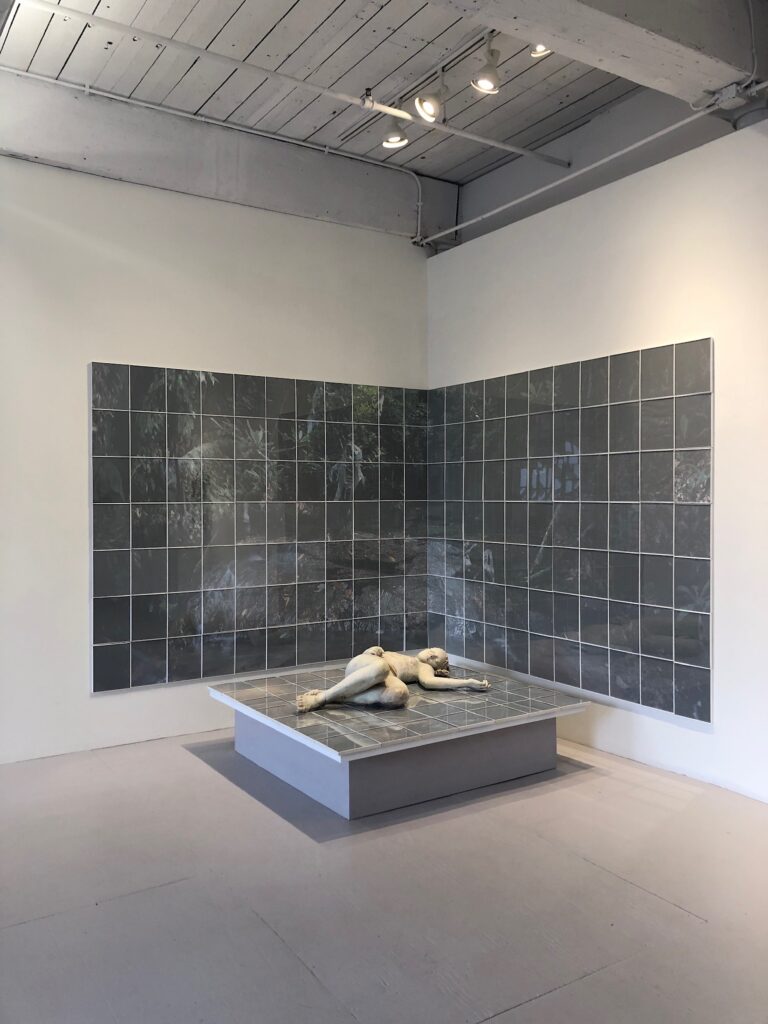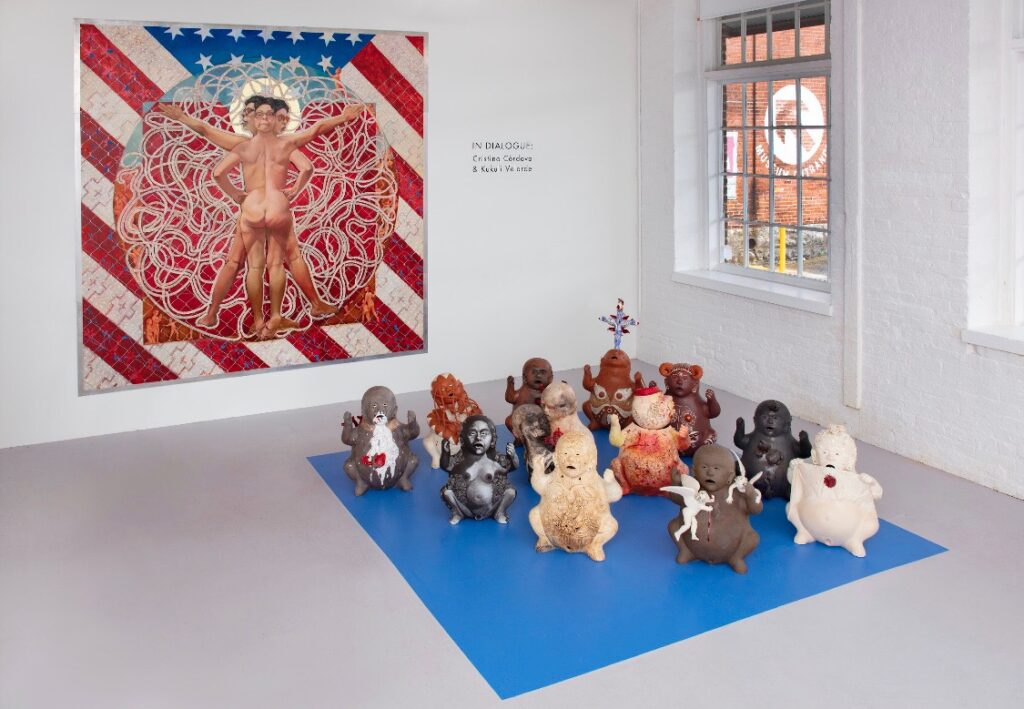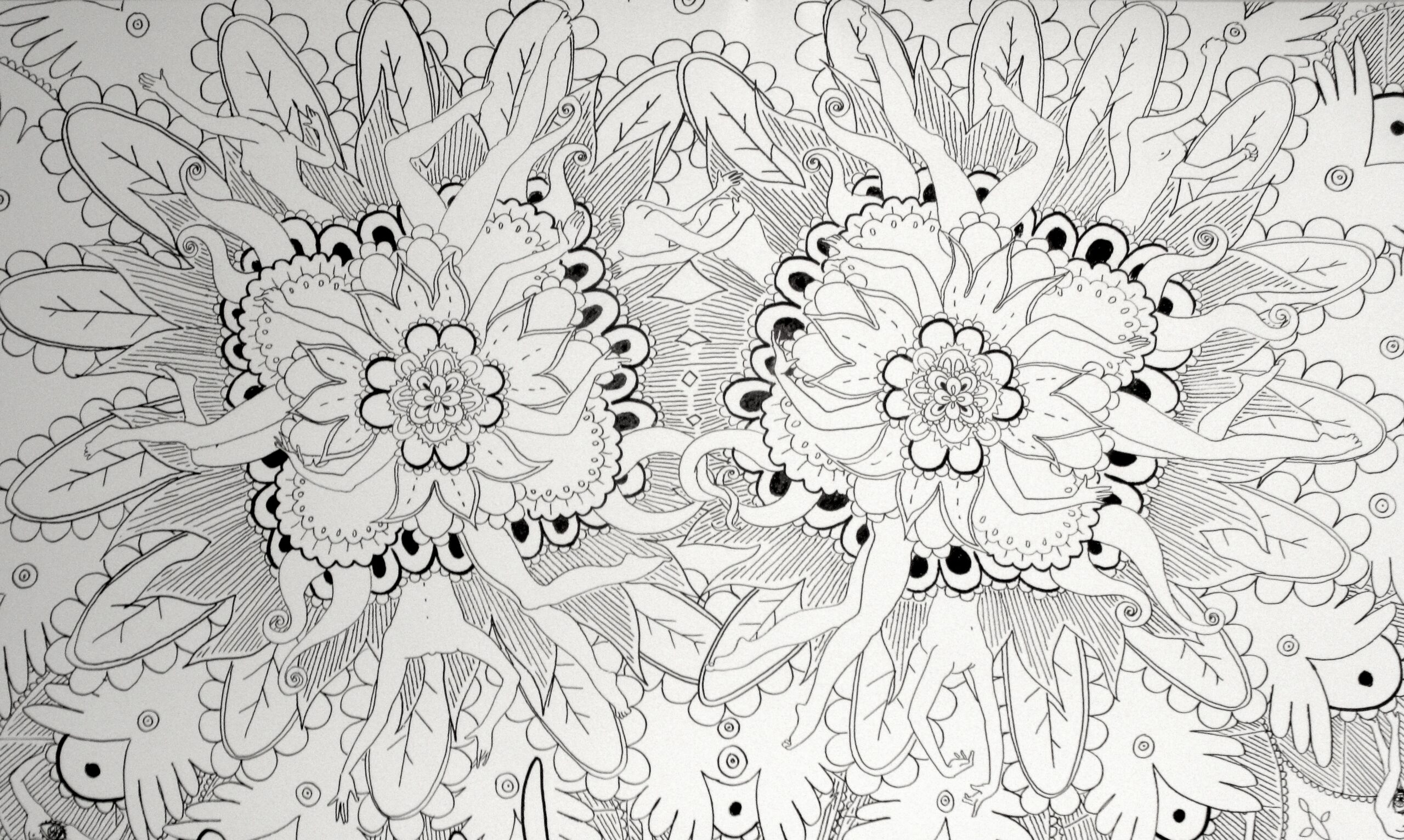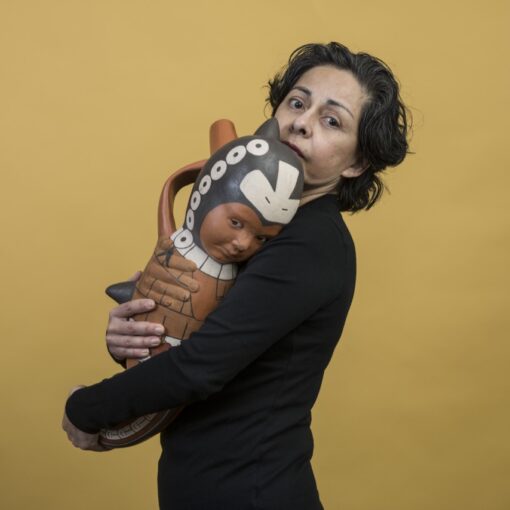- By Jennifer Huberdeau, The Berkshire Eagle Nov 5, 2021
Velarde’s figure is looking out toward America, and at the same time side-to-side and behind, as an attitude of awareness to her surroundings. All of this is painted as an almost-but-not-quite-Vitruvian-meets-the-crucified-Christ-woman to comment on the the cultural expectations of femme and female bodies in a culture that prescribes a paradigm that people cannot fulfill. “With these ideas of universal human aesthetics, nobody can achieve that and we all become ugly. It’s a commentary on erasure,” Velarde says.
The female character, half superhero/half saint, is talking to the audience loud and clear, in a spiral of ribbons that signify speech. She is speaking English and Spanish to anybody who cares to listen/read, and is defending her rights to be herself within a social environment that has become toxic and dangerous for diversity and community. “What is her power?,” asks Velarde. “Perhaps her only power is not to allow others to silence her, to keep going—to exist and resist.”
On View
In Dialogue: Cristine Cordova & Kukuli Velarde
When: Through Dec. 31.
Where: Ferrin Contemporary, 1315 Mass MoCA Way, North Adams
Hours: 11 a.m. to 5 p.m., Wednesdays through Saturdays or by appointment.
More information: 413-346-4004, ferrincontemporary.com
NORTH ADAMS — In one corner of Ferrin Contemporary’s gallery, a series of squat, bulbous two-foot-high clay sculptures, arms raised toward the sky with mouths agape, stare up from the floor where they sit in a military-like formation.
These “Isichapuitu” created by Peruvian artist Kukuli Velarde, are based on a single 16th-century Mesoamerican “vessel of death” of the same name, which she once viewed in the Metropolitan Museum of Art in New York City.
“I feel my body populated by memories, impressions, beliefs, fears and desires. They are imprinted deeply, almost etched. They follow me, tormenting me, or sweetening my path,” Velarde writes in her artist statement about the vessels. “At this stage of my life I wanted to summon their presence, thank them for being, and make peace with each of them. But I didn’t know how, until I saw a photograph of a Mexican statue from the Rockefeller Collection at the Metropolitan Museum in New York … The Isichapuitu installation is an exorcism, but it is also a farewell, and a new beginning.”
It is important, she says that these vessels are on the floor, as they are invading our realm. “They are different organs of a single body presented on the floor, next to each other, as a metaphor of wholeness. Because each of us, we are all sum of viscera and flesh, expectations and disappointments, memories and oblivion, generosities and pettiness.”
In another corner of the gallery, located on the Massachusetts Museum of Cotemporary Arts campus, the lifelike and lifeless body of a young girl lies in the supine position, her clay knees scraped, her hair tussled. The tiles on the wall behind her are of a forest, a river perhaps. The piece, “Altar,” can be seen as one who succumbed to the elements, a a sacrifice.
“I am driven by the primal act of imbuing an inanimate representation with a sense of presence, transforming it into the inspired repository of our deepest longings and aspirations. My goal is to have these compositions perform both as reflections of our shared humanity as well as question socio-cultural notions of gender, race, beauty and power,” Cristina Cordova, of Puerto Rico, who resides in North Carolina, writes in her artist statement.
“Through my work I seek to generate figurative compositions that explore the boundary between the material driven, sensorial experience of an object and the psychological resonance of our involuntary dialogues with the self-referential.”
The work of the Latina artists, at first blush, is as different as can be. But on another level, they are working in dialogue, having conversations about cultural identity and colonial histories, about diversity, gender, personal identities and bearing witness in a time of upheaval.
Jennifer Huberdeau can be reached at jhuberdeau@berkshireeagle.com or 413-496-6229. On Twitter: @BE_DigitalJen
| Jennifer Huberdeau Features Editor Jennifer Huberdeau is The Eagle’s features editor. Prior to The Eagle, she worked at The North Adams Transcript. She is a 2021 Rabkin Award Winner, 2020 New England First Amendment Institute Fellow and a 2010 BCBS Health Care Fellow. |





